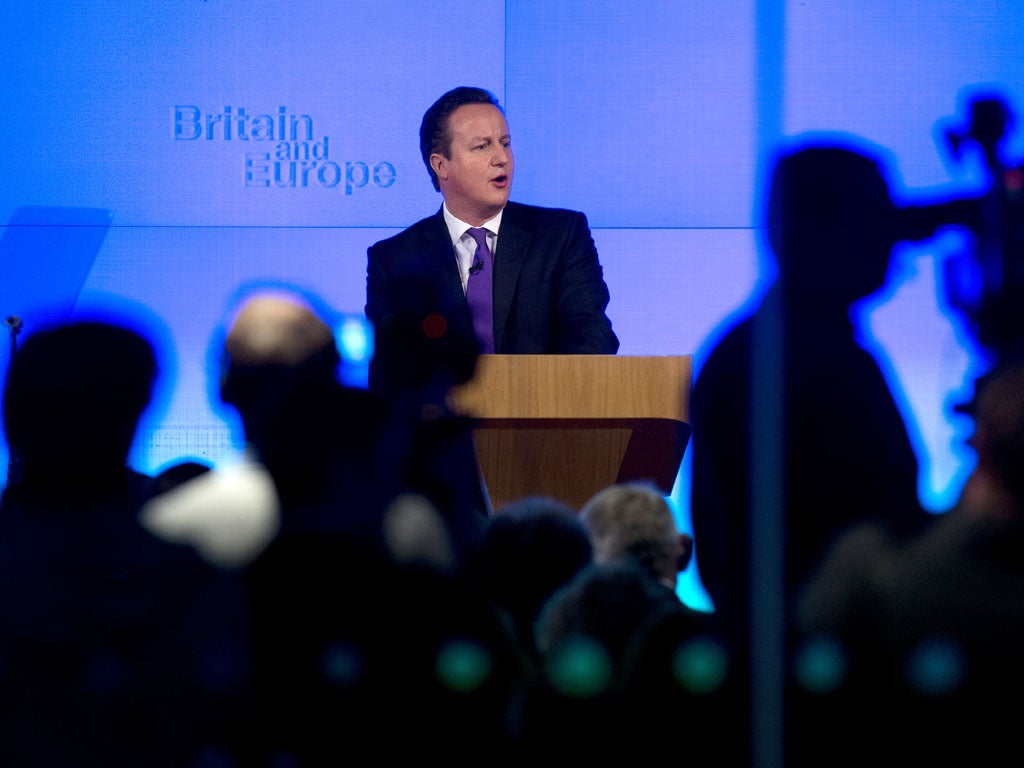After David Cameron's speech this week, Britain risks sliding out of Europe without even wanting to
Plus: why, even in Israel, the hard right vote is by its nature a protest vote, whereas the middle, which can switch either way, gets frightened off by extremism

It’s been a case of the dog that didn’t bark. After all the waiting and the build-up, David Cameron got up, promised an in/out referendum on Britain’s EU membership and no one got very hot under the collar about it, not in Europe, not in the business community and not in the country at large.
On that at least, Ukip’s leader Nigel Farage, is right. This wasn’t a speech to open up the great debate but to close it down. How could it be otherwise? There is no debate about Europe in Britain at the moment.
Tory backbenchers hate it and that is sufficient for them without making an argument over it. Businesses are frustrated with it. The British public have other things on their mind, such as spending cuts, redundancy and the cold.
If Cameron has a reasonable case for saying Britain should reconsider its membership now, it is that the EU states – or rather the eurozone members – are moving down a track which will reshape the Continent. That is the very reason, however, that there is little point starting an argument about repatriating powers. The eurozone is a project in the making. At this point, no one knows where precisely it is going to end up, if indeed it survives at all.
If the Government’s real concern was the direction it was taking and the fate of those outside the zone, its obvious interest would be in gathering as many partners as possible to help shape the outcome.The difficulty of Cameron’s timetable is that Europe’s shape is most unlikely to be clear in four or five years’ time, let alone in time for the next election.
The other reason we are not about to embark on a proper debate about Europe, and probably never will, is that there aren’t two sides ready to join battle. Just as liberalism collapsed under Mrs Thatcher, so the European case is now failing because its proponents no longer have the self-confidence to fight for it.
The fact that the Government found it easy to rustle up 50 businessmen to sign up to a letter supporting the Prime Minister’s case for repatriation of powers, but the BBC was forced to go to an Irishman in Davos – the ever forceful Peter Sutherland, to make the case against him –says it all.
It’s not that there aren’t the people who believe Britain’s continuing membership of the EU is essential. Even the businessmen signing the letter baulked, when pressed, at the thought of leaving the Union. No one, as the contortions over Ed Miliband’s stand in the Commons on Wednesday showed, actually wants to make the case that membership is a good thing. At best, the argument is made in negative terms of the dire results that will occur if we leave.
But then the other side is no different. Virtually none of the Eurosceptics is prepared to outline what they envisage as a Britain outside the Union. All their argument is in negative terms, too.
That, ultimately, is the question that needs to be addressed if Britain ever were to have a proper European discussion. What is it we foresee as the future for our grandchildren, and how do we best position the country to achieve it?
We entered the Common Market without that debate. The opponents of our membership are right to say so. But you’d have to be very naïve to believe that we will decide whether to head for the exit with it either.
The danger now is that we will simply slide out of Europe, not because the public is so keen to leave. None of the opinion polls suggests that voters believe it a priority. We will drift out simply because the pro-Europeans haven’t the stomach for the fight.
Extremism is a turn-off, even in Israel
Just as the Republicans failed in the US presidential elections by lurching too far to the right in order to envelop those voters, and David Cameron is trying to outflank the right over Europe, so Benjamin Netanyahu has come unstuck doing the same in the Israeli elections, this time on settlements.
The problem, as he has found, is that the right-wing vote doesn’t come back because it is, by the nature, a protest vote while the middle, which can switch either way, gets frightened off by extremism.
Not that the wider world needs to take that much comfort from the results. Netanyahu is now more tied to his alliance with Avigdor Lieberman than ever and has made it clear that he still regards facing down Iran as his line in the sand for any coalition partners.
The vote, as always, was more concerned with the economy and domestic affairs than anything to do with Palestine or Tehran. But at least the Israeli public is showing some consciousness of the risks it is taking with international isolation, if only the US and EU would show some teeth in their condemnation of settlement building.

Join our commenting forum
Join thought-provoking conversations, follow other Independent readers and see their replies